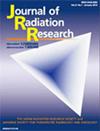第 1 期声门癌放疗起始工作日与局部控制之间的关系:回顾性分析
IF 2
4区 医学
Q2 BIOLOGY
引用次数: 0
摘要
放疗是头颈部鳞状细胞癌,尤其是早期声门鳞状细胞癌的最终治疗方法之一。虽然有一些关于癌症治疗起始工作日的研究,但放疗领域的研究却很少。因此,本研究探讨了开始放疗的工作日是否会影响 1 期声门鳞状细胞癌的局部控制率。2007年至2021年期间,共有105名一期声门鳞状细胞癌患者接受了单纯的明确放疗。周一至周三开始接受放疗的患者组与周四或周五开始接受放疗的患者组进行了比较。67名患者在周一至周三开始接受放疗,38名患者在周四或周五开始接受放疗。周一至周三组的 5 年局部控制率为 98%(95% 置信区间:94-100%),周四至周五组为 83%(95% 置信区间:71-96%),差异显著(P = 0.005)。多变量分析包括年龄、总体给药时间(天数)、分次给药、照射野大小和开始放疗的工作日,除开始放疗的工作日外,未发现其他影响局部控制的因素。两组患者的放疗毒性没有差异。对于1期声门鳞状细胞癌,在周四或周五开始放疗与较低的局部控制率有关;因此,应在周三之前开始放疗。本文章由计算机程序翻译,如有差异,请以英文原文为准。
The association between initiation weekday of radiotherapy and local control in stage 1 glottic carcinoma: a retrospective analysis
Radiotherapy is one of the definitive treatments for head and neck squamous cell carcinoma, especially early-stage glottic squamous cell carcinoma. Although there are several studies on the initiation weekday of cancer treatment, there are very few studies in the radiotherapy field. Thus, the present study investigated whether the initiation weekday of radiotherapy affects the local control rate for stage 1 glottic squamous cell carcinoma. A total of 105 patients with stage 1 glottic squamous cell carcinoma underwent definitive radiotherapy alone between 2007 and 2021. The group in which radiotherapy was started between Monday and Wednesday was compared with the group in which radiotherapy was started on Thursday or Friday. Sixty-seven patients started radiotherapy between Monday and Wednesday and 38 on Thursday or Friday. The 5-year local control rate was 98% (95% confidence interval: 94–100%) in the Monday–Wednesday group and 83% (95% confidence interval: 71–96%) in the Thursday–Friday group, with a significant difference (P = 0.005). On multivariate analysis including age, overall administration time (days), fractionation, irradiation field size and initiation weekday of radiotherapy, no factors other than initiation weekday affecting local control were identified. Radiotherapy toxicity did not differ between the two groups. For stage 1 glottic squamous cell carcinoma, starting radiotherapy on Thursday or Friday is associated with a lower local control rate; therefore, radiotherapy should be started by Wednesday.
求助全文
通过发布文献求助,成功后即可免费获取论文全文。
去求助
来源期刊
CiteScore
3.60
自引率
5.00%
发文量
86
审稿时长
4-8 weeks
期刊介绍:
The Journal of Radiation Research (JRR) is an official journal of The Japanese Radiation Research Society (JRRS), and the Japanese Society for Radiation Oncology (JASTRO).
Since its launch in 1960 as the official journal of the JRRS, the journal has published scientific articles in radiation science in biology, chemistry, physics, epidemiology, and environmental sciences. JRR broadened its scope to include oncology in 2009, when JASTRO partnered with the JRRS to publish the journal.
Articles considered fall into two broad categories:
Oncology & Medicine - including all aspects of research with patients that impacts on the treatment of cancer using radiation. Papers which cover related radiation therapies, radiation dosimetry, and those describing the basis for treatment methods including techniques, are also welcomed. Clinical case reports are not acceptable.
Radiation Research - basic science studies of radiation effects on livings in the area of physics, chemistry, biology, epidemiology and environmental sciences.
Please be advised that JRR does not accept any papers of pure physics or chemistry.
The journal is bimonthly, and is edited and published by the JRR Editorial Committee.

 求助内容:
求助内容: 应助结果提醒方式:
应助结果提醒方式:


